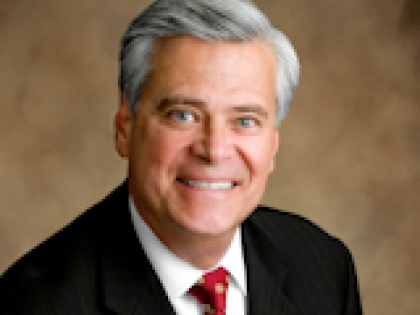
Senate and Assembly Republicans Criticize Democrat State Leaders for Turning Their Backs on Open Budget Process
Dean G. Skelos
March 23, 2009
Senate Republican Leader Dean Skelos, Assembly Republican Leader Jim Tedisco and members of their respective conferences, today criticized Governor Paterson, Senator Malcolm Smith and Assembly Speaker Sheldon Silver for conducting the most secretive budget process in history.
In addition, Senate Republicans said they will not support budget legislation that is negotiated in complete secrecy, dropped on their desks at the last moment and brought up for vote with no chance for examination, and will do whatever is necessary to give the public an opportunity to review budget bills.
“Under the guise of getting a budget done on time, Governor Paterson, Senator Smith and Speaker Silver are prepared to rush through a budget in the dead of night with no time for public input or examination,” Senator Skelos said. “Senate Republicans will insist on adequate time to review the budget bills in the light of day and will do everything we can to stop the last minute passage of secret budget bills and force an open process so sunlight can be shed on them.”
“With only a week to go before one of the most important New York State budgets in decades is due, Assembly Republicans call on legislative leaders to stop breaking the budget reform law that allows the public to have input on the budget process,” Assembly Republican Leader Jim Tedisco said. “To add insult to injury, this secret process is happening as New York faces a monumental economic crisis. People are losing their jobs and their homes. This is the time to negotiate bipartisan agreements with input from every legislator from every part of the state in order to solve our problems.”
Senator Skelos said the members of the Senate Republican Conference will not vote to accept any messages of necessity. In addition, they will do everything the state constitution allows to prevent a vote on budget bills until legislators, businesses, labor groups, school districts and the public have had a chance to review the impact the budget will have on them. The State Constitution requires a quorum of three-fifths of the members to vote on budget bills.**
Senator John DeFrancisco (R-C-I, Syracuse), ranking Republican on the Senate Finance Committee said: “We fully expect that Governor Paterson, along with Democrats in the Senate and Assembly, will attempt to push through a secret budget plan with no time for public review or comment, just like they did with the Governor’s disastrous deficit reduction plan. That is wrong and the people have a right to know what’s at stake and how the budget will impact them.”
“There was jubilation from every lawmaker when the budget reforms became law. But their words were disingenuous because today, all semblance of open government has been erased at the State Capitol,” Assemblyman Tedisco said. “The Governor, Speaker Sheldon Silver and Majority Leader Malcolm Smith are not even trying to pretend to negotiate in public. They’re breaking the reform laws and reneging on their promise of openness and transparency.”
Asssemblyman Jim Hayes (R-Amherst), Ranking Republican on the Ways and Means Committee, said, “Budgets hatched in secret and passed in haste always mean bad surprises for taxpayers. It is because the Democrats who control state government are afraid of public reaction that they are reverting to the most secretive state budget process in America. Taxpayers are demanding relief from the tax and spend ways of the past that caused the state's dire fiscal situation. More than ever, we need openness. The Republicans in the Assembly, and I am sure many of our colleagues across the aisle, want an open, public process. We are ready to meet in legally-mandated conference committees. It's long-past time to get to work.”
Senator Skelos said New Yorkers deserve to know the details of a state budget that could spend almost $125 billion and could contain the largest tax increase in state history.
“The health insurance tax hike the Democrats put in the deficit reduction package was just the tip of the iceberg,” Senator Skelos said. “There is a lot of momentum among Democrats to increase personal income taxes, business taxes, sales taxes, property taxes and other taxes and fees, all to fuel a massive spending increase at a time when we are trying to close a deficit and turn around our economy. And as shown in recent polls, it appears New Yorkers have no confidence in the Governor’s ability to stop his colleagues from raising taxes and spending.”
Earlier this month, Senate Republicans proposed a budget plan that eliminates all of the Governor’s tax increases, spends less than the Executive Budget, restores property tax relief and provide incentives to help businesses grow and create jobs. In addition, the Senate Republican budget plan anticipated a further drop in revenues by adding $900 million to the states reserves, bringing them to more than $2 billion. Neither Senate nor Assembly Democrats introduced a budget bill or resolution and the Governor failed to resubmit his budget to reflect stimulus money, as Senate Republicans called on him to do.
“We’ve demonstrated how we can put together a balanced, responsible budget that does not increase taxes, controls state spending and would help grow our economy to help businesses retain and create jobs,” Senator Skelos said. “Governor Paterson, Senator Smith and Speaker Silver appear to be heading in the opposite direction, according to reports of their closed door discussions.”
####
** Article 3, Section 23 of the State Constitution says that a three-fifths quorum is necessary “On the final passage, in either house of the Legislature, of any act which imposes, continues or revives a tax, creates a debt or charge, or makes, continues or revives any appropriation of public or trust money or property, or releases, discharges or commutes any claim or demand of the State, the question shall be taken by yeas and nays, which shall be duly entered upon he journals, and three-fifths of all of the members elected to either house shall, in all such cases, be necessary to constitute a quorum therein.”
